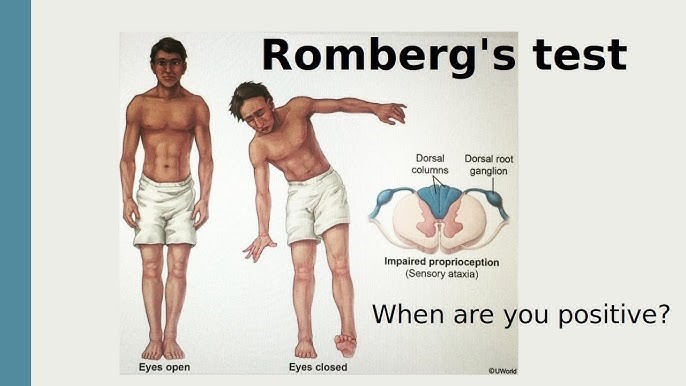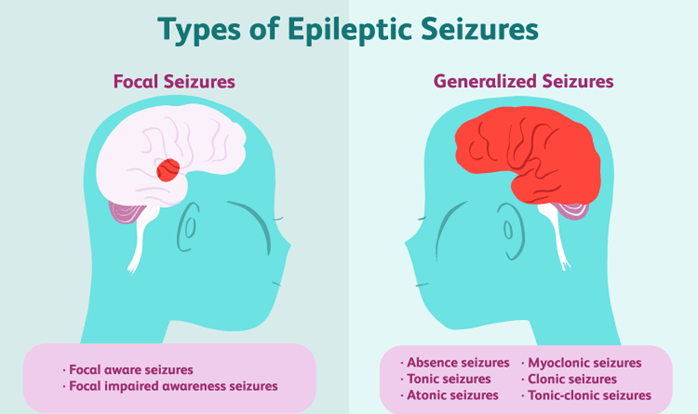The nurse notes that a client has ataxia. Which test does the nurse use to gain more information about this client's gait?
Plantar flexion
Romberg
Achilles reflex
Patellar reflex
The Correct Answer is B
Choice A reason: Plantar flexion is the movement of the foot that points the toes downward. It is not a test for gait, but rather a test for muscle strength and nerve function in the lower leg.
Choice B reason: Romberg is a test for balance and coordination that involves asking the client to stand with their feet together and arms at their sides, first with their eyes open and then with their eyes closed. If the client sways or falls when their eyes are closed, it indicates a problem with their proprioception, which is the sense of position and movement of the body. Ataxia is a condition that affects proprioception and causes impaired gait, so Romberg is an appropriate test for it.
Choice C reason: Achilles reflex is the contraction of the calf muscle when the Achilles tendon is tapped. It is not a test for gait, but rather a test for spinal cord function and nerve damage in the lower leg.
Choice D reason: Patellar reflex is the extension of the lower leg when the patellar tendon is tapped. It is not a test for gait, but rather a test for spinal cord function and nerve damage in the upper leg.

Nursing Test Bank
Naxlex Comprehensive Predictor Exams
Related Questions
Correct Answer is A
Explanation
Choice A reason: "Move objects away from the client." This instruction should be included in the teaching. It is a safety measure that can prevent injury or harm to the client during a seizure. Moving objects away from the client can create more space and avoid contact with sharp, hard, or hot items.
Choice B reason: "Restrain the client." This instruction should not be included in the teaching. It is a harmful action that can worsen or prolong the seizure. Restraining the client can interfere with their natural movements, cause pain or discomfort, or damage their muscles or joints.
Choice C reason: "Place the client on his back." This instruction should not be included in the teaching. It is a dangerous position that can compromise the client's airway and breathing. Placing the client on his back can increase the risk of choking, aspiration, or suffocation.
Choice D reason: "Insert a padded tongue blade into the client's mouth." This instruction should not be included in the teaching. It is an outdated and ineffective practice that can cause more harm than good. Inserting a padded tongue blade into the client's mouth can damage their teeth, gums, tongue, or lips, or block their airway. Contrary to popular belief, it is impossible for a person to swallow their tongue during a seizure.

Correct Answer is ["B","C","D","E"]
Explanation
Choice A reason: Epidemiology interprets legislation in the community is not a statement that indicates the importance of epidemiology to the community health nurse. Epidemiology is not directly involved in interpreting legislation, but rather in providing evidence and recommendations that can inform policy-making and law-making.
Choice B reason: Epidemiology relates to the health status of a population is a statement that indicates the importance of epidemiology to the community health nurse. Epidemiology is the study of how diseases and other health-related factors are distributed and determined in populations. It helps the community health nurse to identify and monitor health problems, trends, and disparities in different groups and areas.
Choice C reason: Epidemiology analyzes and examines the root causes of health outcomes is a statement that indicates the importance of epidemiology to the community health nurse. Epidemiology uses various methods and tools to investigate and explain the causes and consequences of diseases and other health-related events. It helps the community health nurse to understand and address the complex and multifactorial factors that influence health, such as biological, environmental, social, behavioral, and economic factors.
Choice D reason: Epidemiology evaluates the effectiveness of nursing interventions is a statement that indicates the importance of epidemiology to the community health nurse. Epidemiology applies scientific principles and rigorous designs to assess and compare the outcomes and impacts of different interventions and programs on health. It helps the community health nurse to plan, implement, and evaluate evidence-based practices and policies that can improve health and quality of life.
Choice E reason: Epidemiology defines the burden of disease and determinants of health is a statement that indicates the importance of epidemiology to the community health nurse. Epidemiology measures and compares the frequency, severity, and impact of diseases and other health-related conditions on populations. It helps the community health nurse to prioritize and allocate resources, as well as to advocate for health equity and social justice.
Whether you are a student looking to ace your exams or a practicing nurse seeking to enhance your expertise , our nursing education contents will empower you with the confidence and competence to make a difference in the lives of patients and become a respected leader in the healthcare field.
Visit Naxlex, invest in your future and unlock endless possibilities with our unparalleled nursing education contents today
Report Wrong Answer on the Current Question
Do you disagree with the answer? If yes, what is your expected answer? Explain.
Kindly be descriptive with the issue you are facing.
